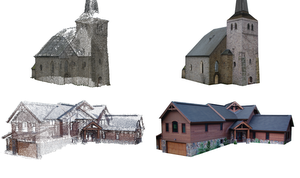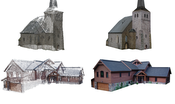Information
- Publication Type: Journal Paper with Conference Talk
- Workgroup(s)/Project(s):
- Date: January 2013
- Journal: ACM Transactions on Graphics
- Volume: 32
- Number: 1
- Location: Anaheim, CA, USA
- Lecturer: Murat Arikan
- ISSN: 0730-0301
- Event: ACM SIGGRAPH 2013
- DOI: 10.1145/2421636.2421642
- Conference date: 21. July 2013 – 25. July 2013
- Pages: 6:1 – 6:15
- Keywords: interactive modeling, surface reconstruction, geometric optimization
Abstract
In this paper, we introduce a novel reconstruction and modeling pipeline to create polygonal models from unstructured point clouds. We propose an automatic polygonal reconstruction that can then be interactively refined by the user. An initial model is automatically created by extracting a set of RANSAC-based locally fitted planar primitives along with their boundary polygons, and then searching for local adjacency relations among parts of the polygons. The extracted set of adjacency relations is enforced to snap polygon elements together, while simultaneously fitting to the input point cloud and ensuring the planarity of the polygons. This optimization-based snapping algorithm may also be interleaved with user interaction. This allows the user to sketch modifications with coarse and loose 2D strokes, as the exact alignment of the polygons is automatically performed by the snapping. The generated models are coarse, offer simple editing possibilities by design and are suitable for interactive 3D applications like games, virtual environments etc. The main innovation in our approach lies in the tight coupling between interactive input and automatic optimization, as well as in an algorithm that robustly discovers the set of adjacency relations.Additional Files and Images
Additional images and videos
![applications video: [109 MB]](https://www.cg.tuwien.ac.at/research/publications/2013/arikan-2013-osn/arikan-2013-osn-applications video:thumb175.png) applications video:
[109 MB]
applications video:
[109 MB]
![main video: [123 MB]](https://www.cg.tuwien.ac.at/research/publications/2013/arikan-2013-osn/arikan-2013-osn-main video:thumb175.png) main video:
[123 MB]
main video:
[123 MB]
Additional files
![draft: [49 MB]](https://www.cg.tuwien.ac.at/research/publications/2013/arikan-2013-osn/arikan-2013-osn-draft:thumb64.png) draft:
[49 MB]
draft:
[49 MB]
Weblinks
- http://dl.acm.org/citation.cfm?id=2421636.2421642&coll=DL&dl=ACM&CFID=399181985&CFTOKEN=14714358
- DOI: 10.1145/2421636.2421642
BibTeX
@article{arikan-2013-osn,
title = "O-Snap: Optimization-Based Snapping for Modeling
Architecture",
author = "Murat Arikan and Michael Schw\"{a}rzler and Simon Fl\"{o}ry
and Michael Wimmer and Stefan Maierhofer",
year = "2013",
abstract = "In this paper, we introduce a novel reconstruction and
modeling pipeline to create polygonal models from
unstructured point clouds. We propose an automatic polygonal
reconstruction that can then be interactively refined by the
user. An initial model is automatically created by
extracting a set of RANSAC-based locally fitted planar
primitives along with their boundary polygons, and then
searching for local adjacency relations among parts of the
polygons. The extracted set of adjacency relations is
enforced to snap polygon elements together, while
simultaneously fitting to the input point cloud and ensuring
the planarity of the polygons. This optimization-based
snapping algorithm may also be interleaved with user
interaction. This allows the user to sketch modifications
with coarse and loose 2D strokes, as the exact alignment of
the polygons is automatically performed by the snapping. The
generated models are coarse, offer simple editing
possibilities by design and are suitable for interactive 3D
applications like games, virtual environments etc. The main
innovation in our approach lies in the tight coupling
between interactive input and automatic optimization, as
well as in an algorithm that robustly discovers the set of
adjacency relations.",
month = jan,
journal = "ACM Transactions on Graphics",
volume = "32",
number = "1",
issn = "0730-0301",
doi = "10.1145/2421636.2421642",
pages = "6:1--6:15",
keywords = "interactive modeling, surface reconstruction, geometric
optimization",
URL = "https://www.cg.tuwien.ac.at/research/publications/2013/arikan-2013-osn/",
}


 draft
draft